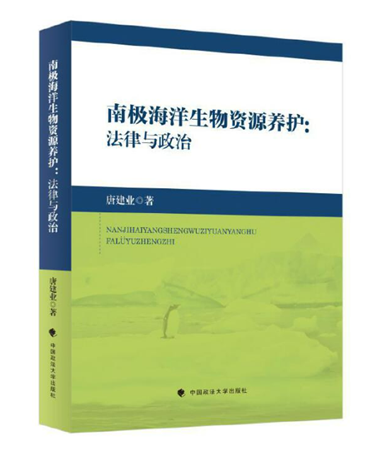On the occasion of the fortieth anniversary of China's polar expedition, Prof. Tang Jianye of the Pelagic Fisheries Scientific and Technological Innovation Team published an academic monograph entitled Conservation of Antarctic Marine Life: Law and Politics, totaling 550,000 words. Based on relevant research results at home and abroad, the book centers on the origin of the Convention on the Conservation of Antarctic Marine Living Resources (CCAMLR) and its practices, and takes the specific contents of the Antarctic krill fishery, Antarctic dogfish fishery, IUU fishing and Antarctic marine protected areas as the carriers to systematically analyze the development of the conservation system for Antarctic marine living resources and its inherent logic of change in retrospect, and reveals the political, legal and scientific games played by relevant countries in the design and evolution of these regimes.

As the world evolves from a uni-polar to a multi-polar world, the issues of climate change and biodiversity have become hot-spots in global ocean governance, and the conservation of Antarctic marine living resources has embarked upon a new stage in parallel. Under the impetus of relevant countries, there has been a trend to use Antarctic marine protected areas as a vehicle for the protection of the Southern Ocean ecosystem, which has triggered disputes over the purpose of the Convention on the Conservation of Antarctic Marine Living Resources and the nature of the organization of the Commission for the Conservation of Antarctic Marine Living Resources.The construction of Antarctic MPAs entered into a polemic over area targets and effectiveness, the conservation of dogfish resources was caught up in scientific, legal and political disputes, and the conservation of Antarctic krill resources evolved into a contradictory synthesis encompassing a number of factors, including resource utilization, climate change, species protection and MPAs.The adoption of the Kunming-Montreal Targets at the 15th Conference of Parties to the UNConvention on Biological Diversity in December 2022 and the Agreement under the United Nations Convention on the Law of the Sea on the Conservation and Sustainable Use of Marine Biological Diversity of Areas beyond National Jurisdiction (BBNJ Agreement) in June 2023 will provide a new catalyst for political and legal controversy over the conservation of Antarctic marine living resources. The BBNJ Agreement will provide a new catalyst for political and legal controversy over the conservation of Antarctic marine living resources.
In September 2023, China's Ministry of Foreign Affairs released A Global Community of Shared Future: China's Proposals and Actions,which proposes to promote and improve the rules of governance of new frontiers such as the Polar Regions (including Antarctica) and “to ensure that all countries share rights and responsibilities. In formulating new rules for governance of new frontiers, the interests and demands of the emerging market economics and the developing countries should be fully reflected.”In order to promote the reform of the Antarctic governance system towards a more just and reasonable direction, in addition to grasping the general trend of the development of the global governance of marine living resources, it is necessary to recognize the political and historical background of the development of the Antarctic marine living resources conservation system, the internal logic of the design of the legal system and its dynamics of development and change, as well as the main contradictions that exist at the present time, and their deep-rooted political and legal logic.
This monograph is a decade-long result of Professor Tang Jianye's research on the practice and theory of Antarctic and global ocean governance. He has not only participated in regional and global meetings such as the CCAMLR meetings, the informal consultative meetings of the United Nations Fish Stocks Agreement, and the meetings of the BBNJ Preparatory Committee during the period of 2010-2022, but also undertaken critical research tasks by the National Social Science Foundation of China (NSSF), the Ministry of Science and Technology (MOST), the Ministry of Natural Resources (MNR) and the Office of Polar Expedition of State Oceanic Administration (SOA).The book is divided into 10 chapters. Chapters 1 and 2 recognize and understand the Antarctic Treaty and the Convention on the Conservation of Antarctic Marine Living Resources (CCAMLR), as well as the legal relationship among the relevant instruments under the Antarctic Treaty system from the perspective of the Antarctic Treaty system; Chapters 3 to 8 analyze in detail the specific management regime for Antarctic marine living resources; Chapter 9 is devoted to the study of Antarctic Marine Protected Areas (MPAs), including the different stages of the development of the issue, specific MPA proposals, and the political, legal and scientific controversies arising from the issue; Chapter 10 is the conclusions and perspectives, provides a retrospective overview of more than 40 years of development of the Convention on the Conservation of Antarctic Marine Living Resources and the Commission for the Conservation of Antarctic Marine Living Resources and the fortuitous similarities between them and global politics. On this basis, it analyzes the impacts of climate change and biodiversity, two of the world's largest multilateralism issues, as well as the BBNJ Agreement on the conservation of Antarctic marine living resources. The monograph concludes with a list of nine national proposals authored by Prof. Tang since 2018 as an appendix, reflecting China's ever-growing and -increasing capacity to participate in Antarctic marine governance.
The monograph is a new milestone of the Pelagic Fisheries Scientific and Technological Innovation Team in studying regional fisheries organizations, which embodies the characteristics of dialectical historical thinking, the combination of theory and practice, and the intersection of multiple disciplines. It analyzes the use of political, legal, scientific and other elements in the regional ocean governance system by taking a regional fisheries organization as an example, so as to provide reference for China's study and in-depth participation in global or other regional fisheries organizations.